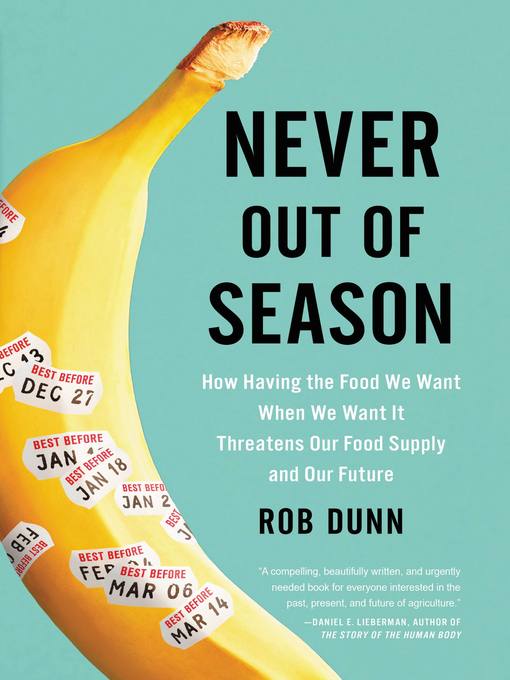
Never Out of Season
How Having the Food We Want When We Want It Threatens Our Food Supply and Our Future
کتاب های مرتبط
- اطلاعات
- نقد و بررسی
- دیدگاه کاربران
نقد و بررسی

January 23, 2017
Dunn (The Man Who Touched His Own Heart), professor of applied ecology at NC State, cautions against monoculture in this cogent and optimistic examination of our food system, arguing that having whatever food we want whenever we want isn’t necessarily a good thing. Using the banana as an example, Dunn shows how the desire for consistency and uniformity in a particular product often ignores the larger picture. Once upon a time, there were all sorts of bananas, but in recent decades commercially available bananas have largely been the Cavendish variety. They are “all genetically identical” and susceptible to an evolved version of the pathogen that destroyed Gros Michel bananas before them. Dunn also looks back at the causes and effects of the Irish potato famine in the 1840s and the threats to African cassava crops during the 1970s. His discussions of Soviet botanist Nikolai Vavilov’s remarkable seed collection in the 1940s are inspiring, and he celebrates the work and commitment of the specialists tasked with guarding it during the WWII siege of Leningrad. That scientists and researchers continue to play significant roles in the fight for agricultural diversity and sustainability gives Dunn hope. Agent: Victoria Pryor, Arcadia Literary.

January 15, 2017
A convincing argument that the agricultural revolution that has made food more readily available around the world contains the seeds of its own destruction.Dunn (Applied Ecology/North Carolina State Univ.; The Man Who Touched His Own Heart: True Tales of Science, Surgery, and Mystery, 2015, etc.) takes a popular science route to his subject, summarizing and consolidating the work of others to make his point: that we have gotten ourselves into trouble by thinning the number of species of our most basic foodstuffs so that around the world, there are typically fewer than a handful of species of staples like wheat, rice, corn, and cassava, the plant that provides the greatest number of calories in the African diet. These are usually highly productive species for which effective pesticides have been discovered, but the downside is that once pests learn how to override the pesticides, crop failure and famine are likely to follow. Dunn goes back through history to one of the earliest, and most disastrous, examples of modern agriculture, the introduction of the potato to Ireland from the New World, which succeeded until the potato blight decimated the crop and caused the death of millions. The author chronicles his travels around the world investigating the successes and failures of attempts by scientists and farmers to stave off natural attacks against crops, including a remarkably successful one to introduce wasps to kill off the mealybugs that were destroying the cassava crop in Africa. Dunn also celebrates the Russians who, during World War II, gave their lives to protect a seed bank in Leningrad, and he writes at length about a "doomsday vault" in Norway in which seeds are preserved against apocalypse. An alarming account but one suggesting that, armed with knowledge, we can reverse this way of treating the plants that feed us and find a way toward a more sustainable diet.
COPYRIGHT(2017) Kirkus Reviews, ALL RIGHTS RESERVED.

February 1, 2017
Dunn (applied ecology, North Carolina State Univ., Natural History Museum of Denmark, Univ. of Copenhagen; The Man Who Touched His Own Heart) argues that modern science has had an adverse effect on food production: crops are bred and cloned so that people have a boundless surplus, and the process is simplified so that food tastes the same each time. The author begins with the history of the banana and its vulnerability to a pathogen that could kill the fruit. He describes how cacao is one of the most endangered crops in the world because of the disease witches' broom. Dunn also devotes a chapter to Henry Ford's agricultural legacy and how the invention of cars and tractors has affected urban and suburban ways of life. Overall, this book explains how scientists are trying to change the artificial production of food, which in turn will help society. Although this volume is thoroughly researched, with many scholarly sources cited, it's accessible, and general readers will find it comprehensible. VERDICT Recommended for anyone interested in agriculture, agricultural history, food science, or general biology.--Tina Chan, MIT Libs., Cambridge
Copyright 2017 Library Journal, LLC Used with permission.

























دیدگاه کاربران